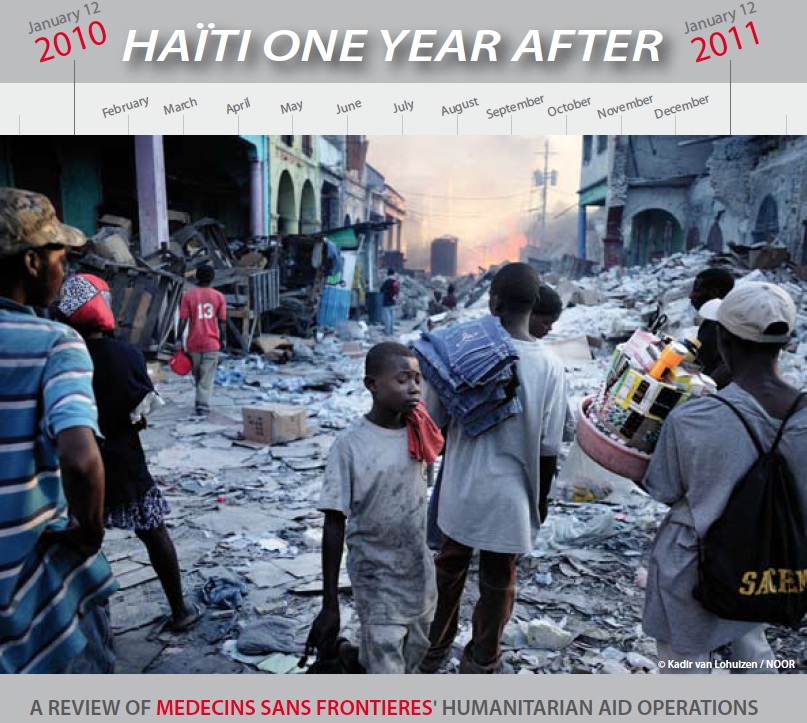 One year after a devastating earthquake killed an estimated 222,000 people and left 1.5 million people homeless, Haitians continue to endure appalling living conditions amid a nationwide cholera outbreak, despite the largest humanitarian aid deployment in the world, said the international medical humanitarian organization Médecins Sans Frontières (MSF).
One year after a devastating earthquake killed an estimated 222,000 people and left 1.5 million people homeless, Haitians continue to endure appalling living conditions amid a nationwide cholera outbreak, despite the largest humanitarian aid deployment in the world, said the international medical humanitarian organization Médecins Sans Frontières (MSF).
Spread of cholera – new challenge
While overall access to basic healthcare has improved since the earthquake, the rapid spread of cholera across the country underscores the limits of the international aid system in responding effectively to new emergencies.
Urgent humanitarian needs must be met while long-term reconstruction plans are pursued. The overall health of the population and the ability to contain the risk of disease outbreaks depend on improving water and sanitation and ensuring that the one million people still living in tents have access to sufficient transitional shelter.
Haitians face today a second and largely preventable disaster in a cholera epidemic that so far has claimed at least 3,600 more lives.
MSF treated 53% of cholera cases
An increase in the number of cholera cases have coincided with demonstrations, violence and uncertainty after the presidential election in November last year. This has made it impossible for many to seek treatment.
Since the start of the cholera epidemic, MSF-supported cholera treatment centres have treated more than 91,000 people out of the 171,300 cases reported nationwide through January 1, 2011. This represents 53 percent of all cases throughout the cou ntry.
ntry.
MSF now operates about 50 treatment centers across the country. In addition to cholera treatment, MSF provides for the supply of clean water in remote areas and villages that lack adequate health care.
MSF’s response in Haiti since the earthquake and the cholera epidemic constitutes the largest disaster operation in the organization’s history.
Aid needed
In the review, issued today by MSF it is said that by the end of 2010, organisation will have spent all of the 104 million euros ($138 million) donated by private individuals to mobilize its earthquake relief effort and respond to the cholera epidemic.
From January 12 to October 31, 2010, MSF medical teams treated more than 358,000 people, performed more than 16,500 surgeries, and delivered more than 15,000 babies. More than 5,700 major operations were carried out over the first three months alone, making MSF one of the largest providers of surgical care.
MSF’s operational budget projections for Haiti for 2011 are 46 million euros ($60.7 million) to maintain a network of six private hospitals in Port-au-Prince, with a total capacity of up to 1,000 beds, and to maintain support of two Ministry of Health hospitals.
Three of the facilities in the capital will be newly constructed in 2011 – including the only functioning burn treatment unit in the capital – replacing temporary facilities established in the aftermath of the earthquake.
Outside the capital, in Léogâne, MSF will continue to run a newly constructed 120-bed general hospital. Among MSF’s operational priorities in Haiti are obstetric, emergency, and trauma care.
obstetric, emergency, and trauma care.
Fear of rape
Half a million of women living in Haiti tent camps live in constant fear of rape, new Amnesty International report says.
One year after the earthquake which killed 230,000 people and injured 300,000, more than one million people still live in appalling conditions in tent cities in the capital Port-au-Prince and in the south of Haiti, where women are at serious risk of sexual attacks.
Those responsible are predominately armed men who roam the camps after dark, but abuses also happen in daylight.
More than 250 cases of rape in several camps were reported in the first 150 days after January’s earthquake, according to data cited in the Amnesty International report.
One year on, rape survivors continue to arrive at the office of a local women’s support group almost every other day.
Sexual violence was widespread in Haiti before January 2010 but this has been exacerbated by the conditions since the earthquake. The limited assistance the authorities previously provided has been undermined by the destruction of police stations and court houses. This has made it more difficult to report sexual violence.
Over 50 survivors of sexual violence shared their experiences with Amnesty International for the study.
Steps to take
Amnesty’s report shows how the lack of security and police in and around camps contributes to the violence has touch ed on during the past year.
ed on during the past year.
Police response to the sexual violence is described as inadequate. Many of those who report and ask the police for help has been told that the police can not do anything.
Amnesty International is calling for the new government to urgently take steps to end violence against women as part of a wider plan to address the humanitarian effort. The report states that women in the camps must be fully involved in developing any such plan.
Immediate steps include improving security in the camps and to ensure police are able to respond effectively and that those responsible are prosecuted.
Related links:
Human Rights House Zagreb collects donations for endangered Haitians





